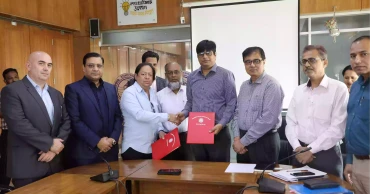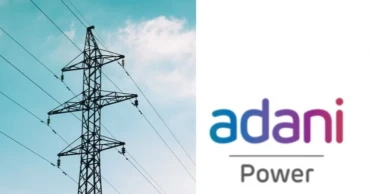PPA
360 MW Haripur unlikely to get extension despite low cost electricity: Sources
Haripur 360 MW combined cycle power plant (CCPP), which generates electricity at lowest cost, is unlikely to get extension after completion of its 22-year initial contract period.
According to official sources, the power plant, established by leading US company AES Corporation in 2001, completed its successful operational period in November 2023. Since then, the government has not taken electricity from the plant.
The AES Corporation developed two large base-load power plants—Haripur 360 MW CCPP in 2001 and Meghbaghat 450 MW CCPP in 2002—with the highest efficiency, but lowest cost.
As per the power purchase agreement (PPA), state-owned Bangladesh Power Development Board (BPDB) had been purchasing electricity from the two first generation independent power producer (IPP) plants.
BPDB officials said that initially, Haripur's power tariff was Tk.1.56 per unit, which is the lowest not only in Bangladesh, but also in the world.
According to a World Bank document publicly disclosed on June 24, 2014 which compared the power generation cost of different IPPS, shows that when the Khulna Power Company Limited was selling electricity to the BPDB at Tk 16.03 per unit in 1998, NEPC at Tk 20.20 per unit in 1999, Haripur was selling it at Tk 1.56 per unit and Meghbaghat was selling power at Tk 2.33 per unit.
Read more: Bangladesh to provide 190 acres of land in Kurigram for Bhutanese investors; discussion to import hydropower underway
Currently, the average generation cost is over Tk 10 per unit. Through a gazette notification issued on March 1, the government set the retail tariff of electricity at Tk 8.95.
Officials said, until last year BPDB was buying electricity from the plant at Tk 3.32 per unit which was the lowest among all other private power plants.
But in November 2023, the PPA expired and BPDB suspended purchasing electricity from the plant.
The BPDB’s such move surprised many as it was unlikely on the part of the government that it unilaterally stopped buying electricity from the most efficient and lowest cost power when it continued purchase of electricity from high cost plants belonging to Summit Group and other plants.
“Actually, there was no strong lobby on behalf of the Haripur plant to pursue the government to renew its contract with the BPDB. That’s why the country will be deprived of the low cost electricity,” a top official of the BPDB told UNB requesting anonymity.
He, however, said the government can offer the owner-company of the Haripur plant to buy it and operate under the BPDB management.
Read more: Power cuts plague Sylhet: Frustration growing among residents and businesses
Sources said the USA-based AES Corporation developed the Haripur and Meghnaghat power plants, after a number of changes into their ownership. Now Malaysian Pendekar Energy Limited owns and operates the two plants.
In 2003, AES sold the plants to the UK company CDC Globeleq, which sold the plants to Malaysia-based Pendekar Group in 2007.
Official sources said the government had to pay Tk 50-55 crore a month to purchase electricity from the Haripur power plant for its 360 MW electricity.
“But from November 2022, the operator of the plant has not been receiving any bills from the BPDB for which it lost interest to continue its operation”, said another source.
He also mentioned that BPDB is also not interested to extend its operation as it has contractual obligation to buy electricity from newly established plants like Summit Group’s Meghnaghat Plant, Unique Group’s Meghnaghat plant and also some coal –fired power plants which electricity cost is between Tk 6.50 to Tk 30 per unit.
Read more: First private sector solar project in Bangladesh secures $121.55 million funding from ADB
1 year ago
Costly rental power plants keep getting extensions, even in the era of surplus capacity
Despite demand being nearly half of electricity generation capacity, the government of Bangladesh continues to extend the tenure of costly rental power plants.
The latest decision for extension of contract for a gas-based rental power plant was made in the Cabinet Committee on Government Purchase on November 8.
As per the decision, a 55 MW gas-based rental power plant of Precision Energy Ltd. will get an extension of 5 years to their existing contract with the state-owned Bangladesh Power Development Board (BPDB).
Under the Power Purchase Agreement (PPA), the BPDB will buy electricity from the plant at a tariff rate of US Cent 5.7 (equivalent to about Tk 6) per kilowatt hour while it has been buying electricity from base-load plants at around half the price.
Read: Despite surplus electricity, contracts of 10 rental power plants extended in four months
For instance, the government has been purchasing electricity from Summit-GE's Bibiyana 450 MW gas-fired power project at US 3.32 cents per kilowatt-hour, with a contract for a period of 22 years.
The government approved a PPA in October 2021 under which Consortium of (1) Edra Power Holdings Sdn Bhd, Malaysia and (2) Winnievision Power Ltd, Bangladesh, will set up the 660 MW base-load combined cycle plant and the BPDB will purchase electricity from the plant over a contract period of 22 years at a levelised power tariff of US 3.679 Cents (equivalent to Tk 2.94) per kilowatt hour to be run by local gas.
The move for continuing the extension of rental and quick rental power plants' contracts raised the eyebrows of the energy experts.
Many experts and power industry insiders believe that such a move to continue entertaining the costly rental power plants will increase the burden on the government for more subsidies, at a time when the sector has already been facing huge capacity payments' obligation with surplus capacity of electricity generation reaching about 50 percent.
Read: Power flow set up from Payra plant to Rampal sub-station
Last year, the government extended the contracts of at least 10 rental power plants with a new provision of “No Electricity, No Payment” but kept a fund allocation of Tk 6,564.08 crore to pay the owners of the rental power plants.
This time also Tk 1205.40 crore was kept as allocation while approving the latest extension proposal of Precision Energy's 55 MW Ashuganj gas-fired rental power plant which will be paid in in next 5 years.
According to the Power Division’s official statistics, as of September 13, 2023, the country's power generation capacity was 27,834 MW including off-grid renewable and captive power, while the highest generated in a day was 15,648 MW.
The BPDB official data shows the country generated 14,021 MW on September 26, while covering the excess demand by resorting to load shedding of 113 MW.
Read: 5 rental power plants with 457 MW get 2-year extension
The demand was decreasing with the coming winter and the country's power demand was recorded to be 10,954 MW on November 8 while on-grid installed capacity was showing 25,339 MW meaning that the surplus capacity was more than double at 14,385 MW.
State Minister for Power, Energy and Mineral Resources Nasrul Hamid, however, defended the extension of the rental power plants’ contracts saying that the deals were extended for “emergency necessity” to tackle the current situation when last year 10 rental power plants' contracts were extended.
“As there is a gas shortage, we have to run liquid-fuel based rental and quick rental power plants on full capacity to meet the demands," he had told UNB.
He also said these plants don’t oblige the government to make 'capacity payment' - i.e. payment for unused electricity, that was the case with some earlier contracts. “As a result, the cost of electricity from these extended rental power plants came down by 30-40 percent from the original cost," Nasrul Hamid said.
The government documents show that of the approved 5 plants in March last year, three belong to Summit Group, one belongs to Dutch-Bangla Group and one to Orion Group.
'Admit the mistake first'
About the country's growing surplus electricity and extension of rental power plants, vice president of Consumer Association of Bangladesh (CAB) Prof M Shamsul Alam said: “There will be a big indiscipline in the power sector as pressure for private sector’s capacity payment will continue to go up while import of primary fuel will be increasing. Finally, it will lead to energy insecurity."
Read: Deal period with rental, quick rental power plant owners can’t be extended: BPDB Chairman
In such a situation, he said, the only way-out is that the government has to admit first it has done a mistake by giving permission to the private sector for excessive power generation without consideration of the demand and then change the current policy and strategy.
Otherwise, the situation will be more difficult to manage as pressure from the International Monetary Fund (IMF) is coming to raise electricity tariff again. If so, it will further push up inflation, he added.
2 years ago
Growing backlog in payments to independent producers a bottleneck in power sector
The growing backlog in payment obligation is emerging as a major problem in Bangladesh's power sector that may impede the growth of the sector.
According to official sources, the payment mode in Bangladesh Government's power purchase agreement (PPA) with the private sector has mainly been made in foreign currency, specially, the US dollar.
As per the existing arrangement, as a single payer the state-owned Bangladesh Power Development Board (BPDB) pays to the private power producers in local currency against its purchase of electricity.
Under the PPA, the private power producers are allowed to convert the payments into US dollars to meet their different kinds of payment obligations like bank loan, fuel and machinery imports and also paying foreign staff salaries.
If the investors are foreign companies, they can repatriate their profits in US dollars, said the officials of the BPDB.
They also noted that the BPDB always remains in constant contact with power producers, their banks and the central bank to smooth the foreign currency repatriation.
But following the dollar crisis in the country, official sources said in recent months, both the BPDB and the private power producers have been experiencing severe problems in getting dollars from their banks and also from the Bangladesh Bank.
Official sources said the BPDB has been struggling to keep up with its payments owed to the private power producers for more than a year.
Officials at the Power Division and BPDB said currently the total owed to the Independent Power Producers (IPPs) is $3.5 billion (equivalent to over Tk 35,000 crore) as of September 2023.
Read: Rooppur Nuclear Power Plant to receive fresh batch of uranium from Russia’s Rosatom at ‘Graduation Ceremony’ tomorrow
As per contract with the government, the IPPs are facing dual problems with their bills. First, they are not getting bills on time and secondly, they are getting partial bills, but not being able to convert the payment into foreign exchange due to the dollar crisis.
A top BPDB official admitted the problem to UNB, saying that they had reached an understanding with Bangladesh Bank under a mediation of the Finance Ministry that the central bank will provide on average $20 million every day to BPDB to cover its costs.
“But we’re not getting more than $10-15 million a day,” a top BPDB official told UNB on condition of anonymity as the issue is very sensitive and he is not allowed to speak on the issue.
He also said that if measures are not taken to contain the growing dues in the power sector it will further aggravate the problem.
Read: Japan provides $1500 million to implement Matarbari coal-fired power plant
Admitting about the payment backlog, Imran Karim, former president of Bangladesh Independent power Producers Association (BIPPA), said the government should take necessary measures to clear the dues in the power sector.
"Otherwise, it will accumulate the dues and create a major problem in the sector", he told UNB.
Energy experts said the country is heading for problems in the power sector and it would have a big impact on the overall economy pushing up inflation further.
Eminent energy expert and advisor to the Consumers Association of Bangladesh (CAB) Prof M Shamsul Alam said the government has been put in such a major problem because of its wrong planning in the power sector.
He said that as a result of the wrong planning, the country is witnessing 50 percent surplus power in summer and 70 percent in winter, for which it is heading towards a disastrous situation.
“There will be a big indiscipline in the power sector as pressure for private sector’s capacity payment will continue to go up while import of primary fuel will be increasing. Finally, it will lead to energy insecurity,” he told UNB.
Read more: Cabinet purchase body approves proposals including 3 solar power plants in private sector
2 years ago
BPDB renews PPA with 100 MW PowerPac Mutiara Keraniganj plant for 2 years
Bangladesh Power Development Board (BPDB) has renewed its power purchase agreement (PPA) with PowerPac Mutiara Keraniganj Power Plant Limited for its 100 MW rental plant in Keraniganj for next two years.
The signing ceremony took place at the boardroom of BPDB, Biddut Bhaban in the capital on Wednesday.
BPDB Secretary Mohammad Salim Reza and Managing Director of PowerPac Limited Ron Haque Sikder signed the agreement on behalf of the respective organisations.
The agreement is titled as the ‘Second amendment to the contract for supply of power on rental basis for two years’.
BPDB Member Mohammad Shamsul Haque, Chief Engineer (Private Generation) ABM Ziaul Hauq, Chief Operating Officer (COO) of Sikder Group Syed Qamrul Islam (Mohon) and senior officials from both the organisations were also present on the occasion.
Addressing the signing ceremony, Ron Haque Sikder said his company will resume generation and supply power to the national grid within the shortest possible time.
Read more: BPDB seeks revised agreement with Adani before importing power from Jharkhand plant
He thanked the BPDB officials for taking all-out measures in successful arrangement of the deal with PowerPac Mutiara Keraniganj Power Plant Ltd.
BPDB Member Mohammad Shamsul Haque urged the PowerPac authorities to start functioning at the power plant soon.
He said the agreement mentions that it will come into effect from the very day the deal is signed between the two parties. So, as now the agreement is signed it is expected that the power plant will start generating electricity immediately, which will be beneficial for both the government as well for the PowerPac.
BPDB Chief Engineer ABM Ziaul Haque said the location of the PowerPac Mutiara Keraniganj Power Plant is too close to the capital city, which is a big plus point and that’s why sooner the production starts here is the better for both PowerPac and the BPDB.
2 years ago
Amid standoff over tariff, transmission lines for electricity from Adani plant completed
The 104 km Bogra (West) to Rohanpur 400 kV grid transmission line and substation is ready to carry electricity from Adani Power's 1,600 MW thermal power plant in Godda district of Indian state of Jharkhand, although the issue of revising the tariff structure, that the government of Bangladesh is belatedly pursuing, is not settled yet with the Indian company.
“Our transmission line and associated substations are ready for operation. We’ve been conducting some test runs of the installations,” said Md. Alamgir Hossain, the project director of the Southwest Transmission Grid Expansion Project.
According to official sources, the Power Grid Company of Bangladesh (PGCB) has been implementing the project with the financial support of the Asian Development Bank (ADB) at a total cost of Tk 3273.78 crore. The Bangladesh government and PGCB are also financing the project.
Read More: Why we take power from India’s Adani Group at higher prices, questions MP Chunnu
The electricity from Adani Group will enter Bangladesh through a 26 km line from Bangladesh border to Rohanpur and then it will come to Bogura grid substation.
Recently, dismissing any uncertainty over the Adani power’s availability to Bangladesh national grid, State Minister for Power, Energy and Mineral Resources Nasrul Hamid said the electricity from the Jharkhand power plant will be added to the national grid in March as per the agreement.
As per the report, Adani Power recently sent a request for BPDB to issue the demand note, where the coal price is quoted at $400 per metric ton - far above what BPDB officials believe it should be given the present state of the international market.
Read More: Adani Power team likely to visit Bangladesh to discuss coal price, power tariff
A highly placed source at the BPDB said that the organisation sent a letter date January 23 referring to State Minister-led delegation’s recent visit to the Adani plant mentioned, “During the discussion your side also opined that suitable mechanism will be devised to reduce this inconsistency of coal price by adjusting/changing the coal pricing mechanism of the power purchase agreement (PPA)”.
Nasrul Hamid said the tariff of Adani's power will be competitive compared with other coal-fired plants like Payra power plant.
However, official sources said BPDB is yet to receive any official reply from the Adani Group on its request for revising the power tariff through “adjusting/changing the coal pricing mechanism of the power purchase agreement (PPA)”.
Read More: BPDB seeks revised agreement with Adani before importing power from Jharkhand plant
“A representative has informed us that a high level team will visit Bangladesh soon to discuss the coal price and power tariff issue,” he told UNB on condition of anonymity.
Since practically all the power generated by the plant located in the Godda district of Jharkhand state will be exported to Bangladesh, Adani Power requires a demand note from BPDB that it can present to Indian authorities before opening LCs against the coal import.
Adani Power recently sent a request for BPDB to issue the demand note, where the coal price is quoted at $400 per ton -- far above what BPDB officials believe it should be given the present state of the international market.
Read More: The Tk 700 crore per month hole in the deal with Adani Power
“In our view, the coal price they have quoted ($400/MT) is excessive - it should be less than $250/MT, which is what we are paying for the imported coal at our other thermal power plants," the BPDB official said.
A number of BPDB officials told UNB the Adani’s power tariff might be between Tk 20-22 per kilowatt hour (each unit) because of the absence of a provision for discounts on the purchase of coal in the PPA signed with Adani Power, that allowed the Indian firm to quote such a steep bill for the coal.
The absence of such a provision is all the more notable since it was made mandatory in the PPAs for thermal power plants signed with other independent power producers, domestic or foreign. In these PPAs, the price of coal to be purchased as primary fuel was kept as “pass-through”.
Read More: Adani’s 750 MW power to come to national grid in March: Nasrul Hamid
Officials said that they have been working on a number of alternatives to offer Adani so that its coal price could be reduced to ultimately lower the power tariff.
"If Adani's power tariff is not competitive, it would be difficult for BPDB to keep it on the merit list to take its electricity for the national grid,” said another top BPDB official.
3 years ago
Bangladesh to sign PPA with Indian companies to purchase 500 MW electricity from Nepal
Bangladesh is going to sign a power purchase agreement (PPA) with Indian companies GMR Karnali Hydropower Company Limited and NTPC Vidyut Vyapar Nigam (NVVN) to buy 500 MW of electricity.
In the joint steering committee (JSC) meeting between the two countries held last Thursday, the Bangladeshi side expressed its commitment to sign a PPA with the Indian companies, according to the Ministry of Energy, Water Resources and Irrigation of Nepal, as reported by Kathmandu-based news portal Urja Khabar.
The signing is expected to take place within the month of September, that features the visit of the Bangladesh prime minister to Delhi.
The PPA is sought to be a strategic move to carry out cross-border energy trade between Nepal and Bangladesh. Bangladesh has been consistently expressing its interest in purchasing electricity from Nepal.
Bangladesh industry insiders said the import of 500 MW of electricity will be an addition to the country’s current generation capacity of over 25,000 MW of which more than 40 percent remains unutilized, while the power utilities have to resort to about 2000 MW of loadshedding daily under a rationing programme due to shortage of primary fuel.
Also read: Power supply situation now better than last month: Nasrul Hamid
They also said although Bangladesh will import electricity from Nepal, it has to sign PPA with two Indian companies as the Indian generation company GMR will generate electricity from Nepal while the NVVN will supply it through Indian territory.
As per a bilateral arrangement between Dhaka and New Delhi, if Bangladesh wants to import power that will come from Indian territory, it has to purchase it from an Indian company, they said.
GMR Karnali Hydropower Company Limited is a subsidiary of the New Delhi-based GMR Group while NVVN is a power trading in the country formed by Indian state-owned NTPC Ltd in the year 2002.
It may be mentioned that the Cabinet Committee on Government Purchase (CCPP) in a meeting in December 2019 approved the proposal of the Power Division to import 500MW electricity from the Indian company’s power plant in Nepal.
The bulk electricity will be imported through Indian company NVVN complying with the Indian regulatory commission’s terms and conditions.
As per the proposal, Bangladesh will import the electricity from Indian firm GMR at a tariff rate of $7.7172 (equivalent to Tk 7.36 if current US dollar rate is considered at Tk 95.49) per kilowatt hour (each unit) for over a period of 25 years.
For the import, the government will have to pay a total amount of over Tk 40,000 crore to GMR through NVVN over the period, said the Power Division sources.
Under the Power and Energy Increase of Speedy Supply Act (SPA) 2018, now the BPDB will sign power sales agreement with the NVVN to import the electricity from the GMR.
The Nepalese news portal reports that the Thursday meeting also reached a five-point bilateral consensus on energy cooperation between the two countries.
The discussion has pointed out the possibility that Bangladesh could utilize the unexploited capacity of its high voltage direct current structure at Veramara power plant to import 40-50 MW of electricity from Nepal in the initial phase.
With this possibility in place, the energy authorities of the two countries, Nepal Electricity Authority and Bangladesh Power Development Board will be requesting the Indian NVVN to sign a trilateral PPA.
Also read: Office timing rescheduled for 8:00am to 3:00pm to save electricity
Similarly, Nepal will be providing the environmental assessment report of 683 MW Sunkoshi-3 Hydropower Project to Bangladesh. In this regard, Bangladesh has consented to come up with necessary comments over the report soon to expedite forming a joint team to take forward the project construction.
Nepal and Bangladesh would like to initiate a trilateral agreement with India to construct a dedicated transmission line on the Indian land, prepare an agreement draft for cooperation in renewable energy including solar home systems, collaborate on providing training and make a future guideline for bilateral capacity building, according to the clauses that the two countries consented to in Thursday's meeting, reports the Urja Khabar.
3 years ago











